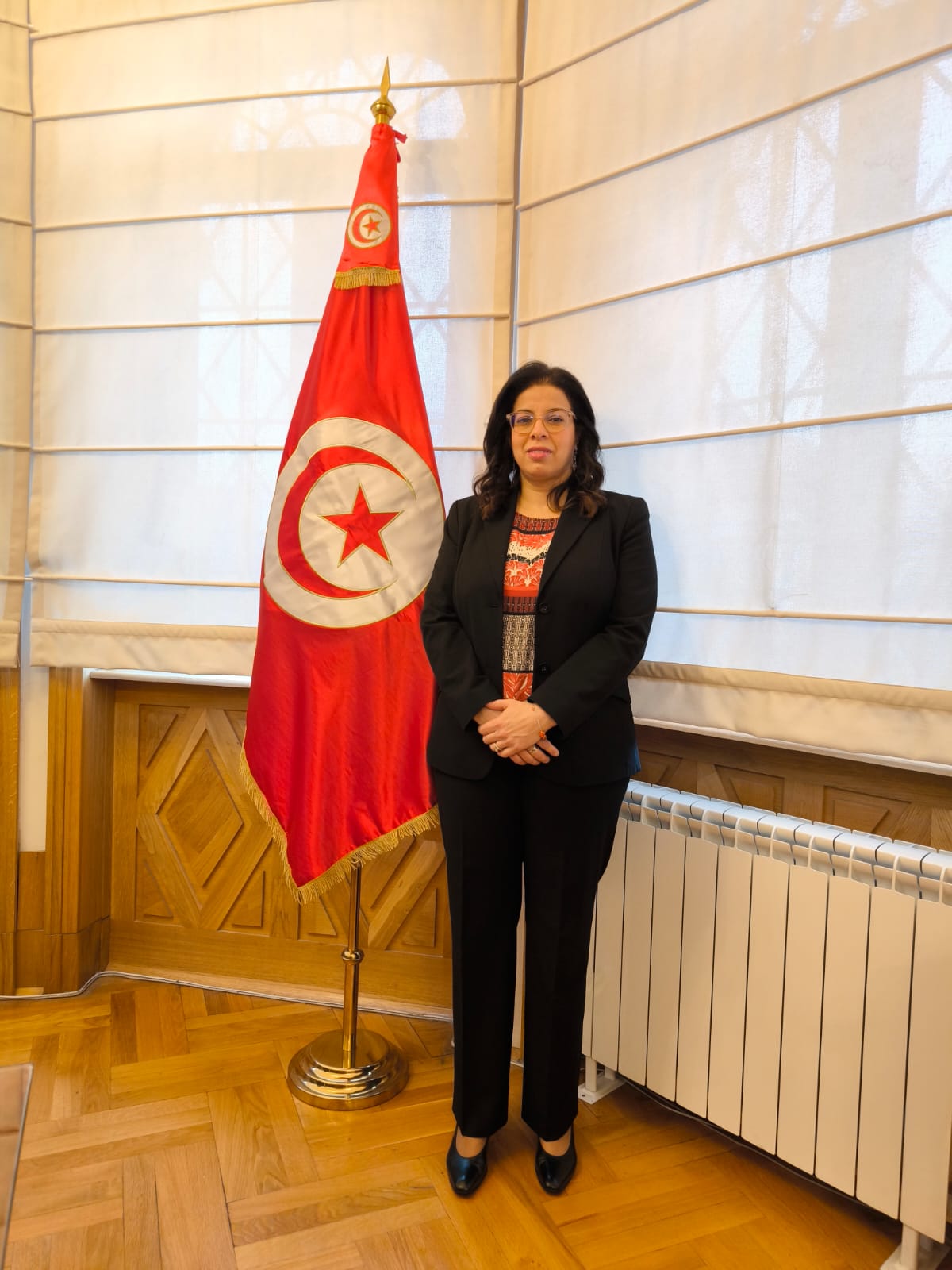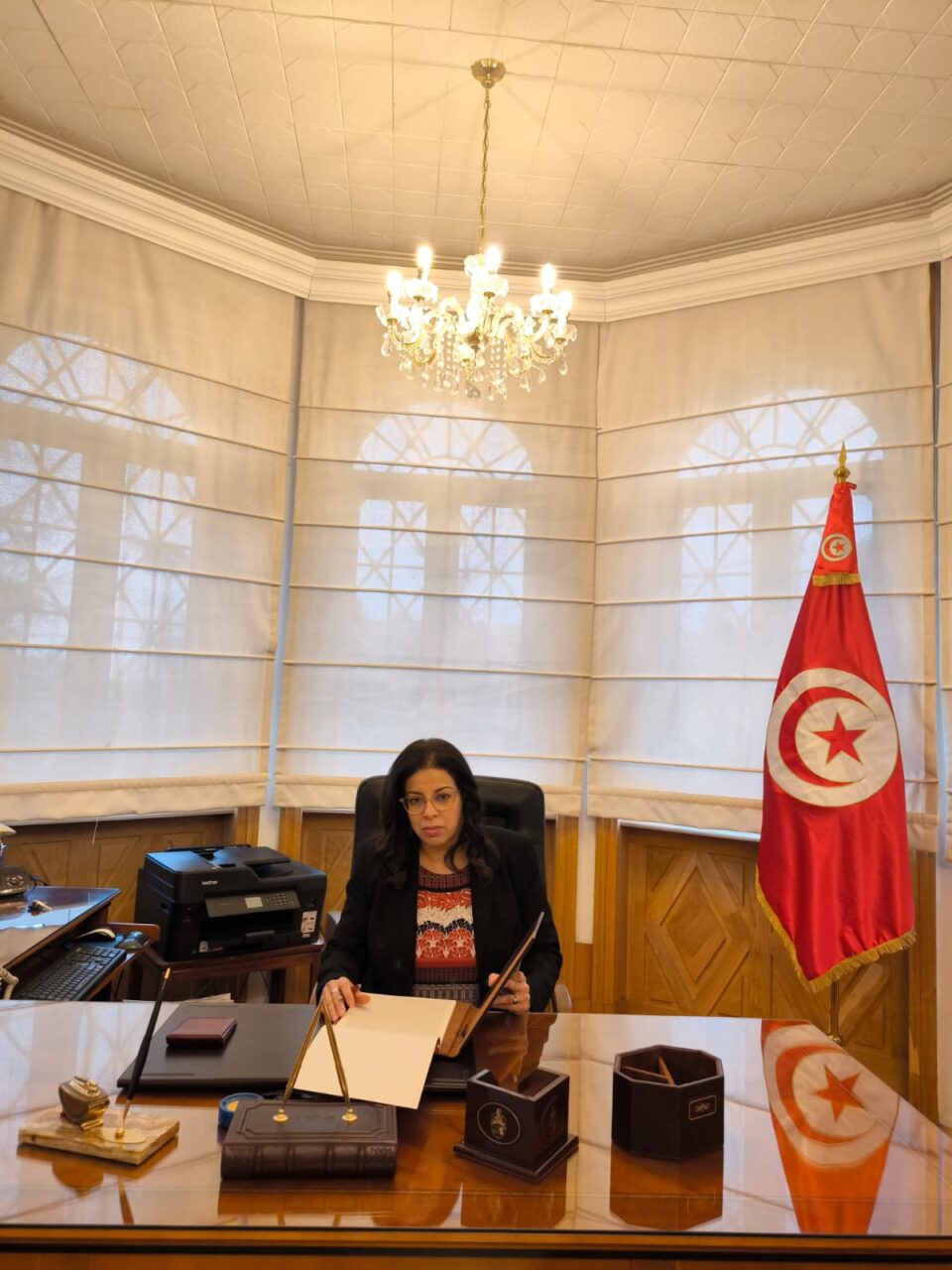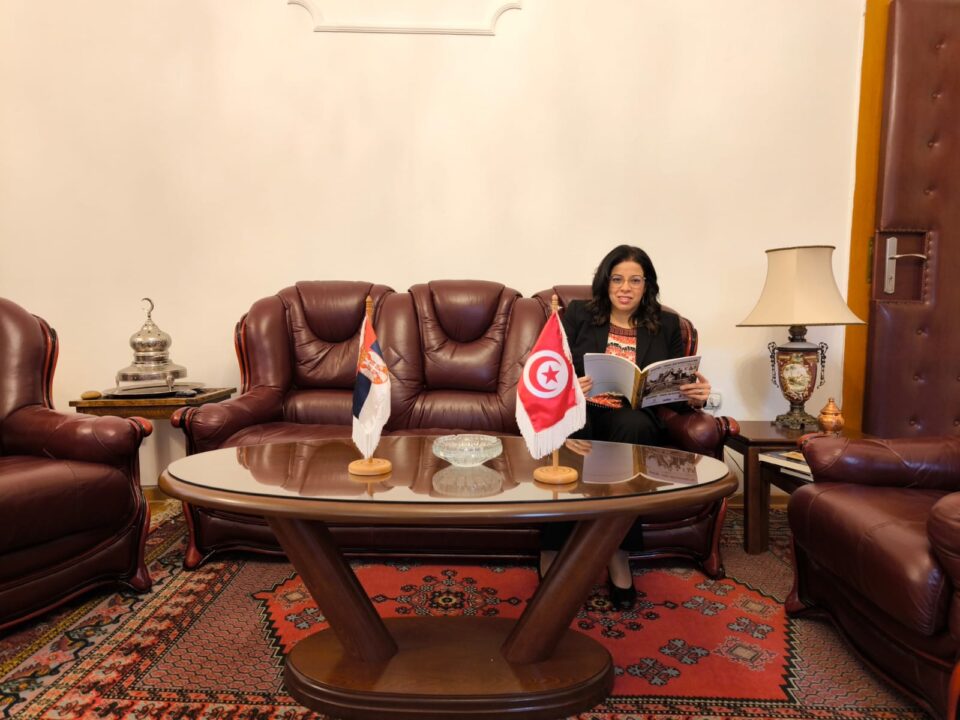We have the responsibility to let future generations from both countries know how close our relationship is and how important it is to preserve it

In a conversation with the recently appointed Tunisian ambassador to Serbia, H.E. Mrs. Imen Laajili Ammari, we touched on the friendship between our two nations that has lasted over 100 years and all the possibilities for further development of bilateral cooperation, which is already at an amazing level.
Could you share your insights on the current state of Tunisia-Serbia relations, and what potential areas do you see for strengthening these ties in the near future?
Allow me first to express my great satisfaction regarding the excellent relations between our two countries. The Republic of Tunisia and the Republic of Serbia have traditionally good and historical ties dating back more than 100 years when 52.000 Serbian soldiers and civilians injured in World War I were moved to Tunisia to receive medical care. Today, there are 3700 Serbian graves in Tunisia’s cemeteries (Bizerte, Menzel Bourguiba, and Tunis), a symbol of the privileged relationship between the two countries, which had been reinforced during the period of former Yugoslavia, thanks to the friendship between Presidents Habib Bourguiba and Josip Broz Tito and their leadership in the non-aligned movement.
During the last five years, we had an exchange of visits between the Ministers of Foreign Affairs in December 2017 in Belgrade and then in March 2019 in Tunis. That was an occasion to discuss how to reinforce the legal framework between our two countries. We are now working together at the experts’ level to finalize several draft agreements, especially in the economic and commercial fields. We expect an exchange of visits on a high level between both countries, and we are working closely to further bind the ties between Tunisia and Serbia and to give an impetus to our economic relations. There is great potential in the economy, education, technology, culture, and other fields, such as military and security cooperation.
We are proud of our historical and excellent relations of friendship with the Republic of Serbia. We have always supported each other in all matters, whether on the bilateral level or on the multilateral one. Our relationship is distinguished by a convergence of views on the main issues and a willingness to coordinate positions in international fora. As two countries that are committed to respecting international law and legality, we can contribute together to the promotion of peace in the world.
Are there any specific initiatives or programs you plan to introduce to promote cultural exchange and understanding between Tunisia and Serbia?
First of all, I’m very happy to announce the record number of Serbian tourists who visited Tunisia in 2023: more than 33,000 tourists. This is the most important step in exchanging culture and reinforcing ties between our two friendly peoples.
The rapprochement between peoples also occurs through a mutual understanding of each country’s specificities and traditions. In this spirit, I intend to attach particular importance to promoting relations between the Tunisian regions and their Serbian counterparts through the strengthening of decentralized cooperation and the conclusion of twinning agreements between cities and municipalities.
We are proud of our historical and excellent relations of friendship with the Republic of Serbia
We will also continue to support Serbian musical groups’ participation in Tunisian festivals and encourage Tunisians’ presence in all cultural events organized in Serbia.
Although my mission in Serbia started only a few months ago, I have already met with Serbian partners and prospected with them many cultural projects that can contribute to reinforcing exchange and friendship between our two peoples. We have the responsibility to let future generations from both countries know how close our relationship is and how important it is to preserve it.
 What are the key sectors where you see opportunities for increased economic and trade cooperation between our two nations, and how do you plan to facilitate this growth?
What are the key sectors where you see opportunities for increased economic and trade cooperation between our two nations, and how do you plan to facilitate this growth?
Both countries have great and strong potential to develop economic and trade cooperation, which, for the moment, does not really reflect the quality of our political relations.
From our side, agri-food (mainly dates and olive oil), phosphate and its derivatives, tourism, and mechanical, electrical, and automotive components could be the main sectors of our economic and trade cooperation.
I strongly believe that the first step to facilitate the growth of commercial cooperation is to start by strengthening the legal framework, in particular, through the conclusion of the cooperation agreement on free trade, which is currently being examined by the Serbian side.
Furthermore, promoting the participation of Tunisians and Serbians in fairs and economic exhibitions in the two countries, the organization of bilateral economic days, and the establishment of contact between businessmen through B2B meetings would be good opportunities to facilitate the development of economic and commercial cooperation between the two countries.
It is important to mention that we have a Tunisian foreign investment in Serbia through the Tunisian company COFICAB, which is a member of the Elloumi Group. COFICAB is a world leader in the design, manufacture, and sale of electrical wires and cables for the automotive industry. The company started operating in Serbia in 2016, and today, more than 300 employees work in its different departments.
Tunisia and Serbia have good legal frameworks and many incentives for foreign investments. It is now our duty to encourage economic operators to explore the opportunities in both countries.
This is without forgetting the role that Tunisian companies can play in facilitating access for Serbian companies to the African markets. Tripartite cooperation could be developed for this purpose.
How do you envision Tunisia and Serbia collaborating in the fields of technology and education to foster mutual development?
The enrichment of the legal framework and the establishment of an annual program in the field of High education, in particular, the information technology, would allow an exchange of experts and students. For this purpose, a Memorandum of Understanding on cooperation in the field of information and communication technologies and digital economy between the two countries is ready to be signed.
Also, Serbia is offering scholarships for African students, which could be an opportunity to enhance cooperation in the education field.
It should be noted that Tunisia is renowned for the good quality of its education and its training of qualified engineers, particularly in the IT field. This is a point in common with Serbia, which also offers know-how and a qualified workforce in this field. An exchange of expertise, particularly in the creation of start-ups, would be an opportunity to strengthen cooperation in this area.
Serbia is offering scholarships for African students, which could be an opportunity to enhance cooperation in the education field
What do you perceive as the primary challenges in your role as the Ambassador to Serbia, and what strategies do you intend to employ to overcome them?
As Ambassador, I would not perceive my mission as challenges to overcome but rather as opportunities to take and goals to achieve for the good of our two peoples and countries. I feel lucky and happy to serve in a friendly country that respects diplomatic work as well as the two Vienna Conventions, which facilitate the mission of any Ambassador accredited to Serbia.
Since my arrival in Belgrade, I have received a warm welcome from all the Serbian officials I have met, who have expressed their support and determination to facilitate my noble mission in Serbia. I take this opportunity to thank all of them for their support.
I already feel at home, and I strongly believe that our historical and excellent political relations are a solid basis for further developing and enhancing the cooperation between our two countries.
What are your personal goals and vision for your tenure in Serbia, and how do you plan to achieve them?
An ambassador has no personal objectives; my main role is to ensure that my country’s foreign policy is implemented as defined by H.E., the President of the Republic of Tunisia. I must protect Tunisian nationals and defend my country’s interests.
To this end, I have set objectives and defined an action plan in order to achieve them.
I am determined to preserve the traditional bilateral relations between the Republic of Tunisia and the Republic of Serbia. I will work with the Serbian authorities on the conclusion of the draft agreement on free trade between the two countries, which is a priority if we really aim to develop our economic relations. Particular interest will also be given to the promotion of cultural relations.
On the other hand, I am happy that the new Ambassador of Serbia to Tunisia, Mrs. Dijana Ivancic, recently presented her credential letters to H.E. Mr. Kais Saied, President of the Republic of Tunisia. This will contribute to the reinforcement of the relations of cooperation and friendship between the two countries since we are both highly committed to working closely in the same direction to promote them.
